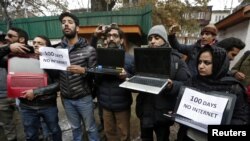India took more than 20 foreign diplomats on a visit to disputed Kashmir on Wednesday, the second such trip since Prime Minister Narendra Modi's Hindu nationalist government stripped the region of its semi-autonomous status last summer.
India's foreign ministry in a statement said the New Delhi-based envoys would meet representatives of the civil society, including youth from different ethnic and religious communities, local business and political leaders, civil administration and representatives of mainstream media.
The delegation included envoys from Germany, Canada, Bulgaria, Nigeria, France, New Zealand, Mexico, Italy, Afghanistan, Austria, Uzbekistan, Poland and some members of the European Parliament. They'll stay in the region for two days.
The diplomats were driven in a motorcade amid tight security from the airport to a luxury hotel at a high-security zone. They also went for a boat ride in the Dal Lake in Srinagar.
Tahir Qadiry, an Afghan diplomat, told reporters after the boat ride that “everything is normal and alright here. We saw children on the way to their school, which is a sign of normalcy.”
All schools and colleges in the Himalayan region are closed for winter vacations since December, and it wasn't clear what Qadiry was referring to.
He also tweeted that the the envoys “are interacting with the traders, businesswomen & entrepreneurs in Srinagar about the status of business & tourism.” However, social media sites including Twitter continue to be blocked in Kashmir on security grounds even though authorities restored the slow-speed Internet on mobile phones in January.
India has been organizing visits for foreign envoys after it ended Muslim-majority Kashmir's semi-autonomous status in August last year. The move was accompanied by a harsh crackdown, including tens of thousands of additional troops in the already heavily militarized region, a sweeping curfew, and thousands of arrests.
Authorities have since eased several restrictions, including some Internet services.
Outside access to the region, however, remains limited, with no foreign journalists allowed.
Wednesday's visit of the envoys comes before Modi's trip to Brussels for the India-European Union summit on March 13.
“These visits are organized as a smokescreen to trick the international community into believing that everything is fine in Kashmir and to support the Indian viewpoint,” said Abdul Rashid, a Kashmiri trader.
Abrar Ahmad, a student, said that ``such delegations must come out of the high-security zones to know what Kashmiris are facing and what they want.''
Kashmir is divided between India and Pakistan but claimed by both in its entirety. The two countries have fought two wars over control of the region.
India accuses Pakistan of arming and training rebels who have been fighting for Kashmir's independence or its merger with Pakistan since 1989. Islamabad rejects India's charge and says it only provides moral and diplomatic support. About 70,000 people have been killed in the armed uprising and the ensuing Indian military crackdown.
India Takes Foreign Envoys to Disputed Kashmir




